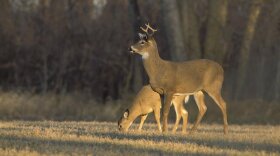Elizabeth Rembert
Reporter, Nebraska Public MediaI cover food, agriculture and rural communities for Harvest Public Media. I’m based at Nebraska Public Media in Lincoln, Nebraska.
I’m a born-and-raised Nebraskan, from a rural community in the northeast part of the state. My family’s farm gave me an early perspective on how agriculture’s impact on food, culture, the environment, the economy … the list goes on.
I studied journalism at the University of Nebraska-Lincoln and graduated in 2019. I spent a little over two years with Bloomberg News in New York City before returning home to report on Midwest stories full time.
If you have story ideas for me or just want to say hi, feel free to reach out via email erembert@nebraskapublicmedia.org or follow me on Twitter @Ekrembert.
-
Both abortion rights activists and abortion rights opponents are trying to get amendments on Nebraska's ballot in this fall's ballot — and whoever gets the most votes wins.
-
Nebraska and Maine long ago discarded the Electoral College's winner-take-all approach to allow split ballots if a candidate wins the popular vote in a congressional district.
-
The National Music Museum has one of the world’s largest and most significant collections of historical instruments — a sort of musical Smithsonian. But it’s far away from the museums on the national mall. It’s in Vermillion, South Dakota.
-
Meteorologists and climatologists often have a tough job explaining climate change to the public, especially in places where audiences may be more skeptical of the science. In the Midwest and Great Plains, strong resistance has pushed some out of the field.
-
Explaining climate change can be a challenging job, particularly in areas where the public is more wary of the science. Some climate experts in the Midwest and Great Plains have faced death threats.
-
Farmers got a slightly smaller percentage of what consumers spent on food last year than the year before, according to the most recent report from the U.S. Department of Agriculture. In most cases, Thanksgiving staples return cents on the dollar to farmers.
-
As Congress negotiates a new farm bill, some are hoping for higher subsides to help save farms hurt by low crop prices or poor harvests. Others argue the backstops are a waste of taxpayer funds.
-
Chronic wasting disease — which affects deer, elk and moose — continues to spread throughout the Great Plains and Midwest. Just this year, authorities in western Oklahoma detected the state’s first case in a free-ranging deer.
-
Farmers say Title One — a farm bill program that sends money when crop prices or harvests get low enough — isn’t working as a buffer against tough years. Yet others argue the nearly 100-year-old safety net is costing billions of dollars with few strings attached.
-
The farm bill sets crucial policy for food assistance, crop insurance and more, and it’s set to expire Sept. 30. Congress is unlikely to meet that deadline, and they still need to decide how much money to spend on the bill.






